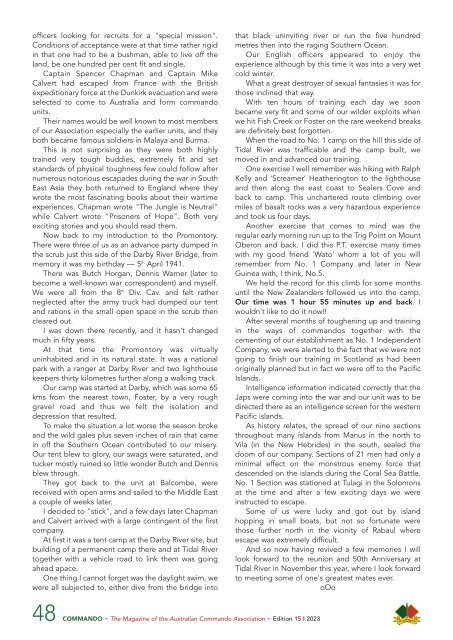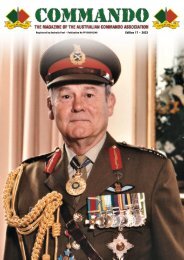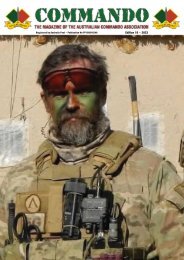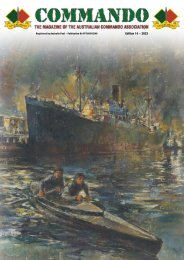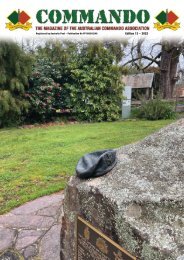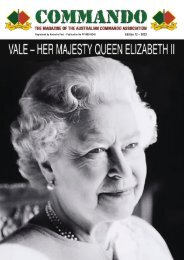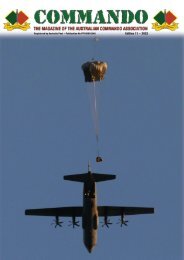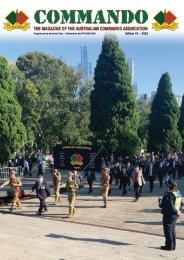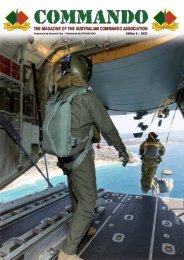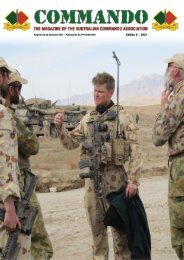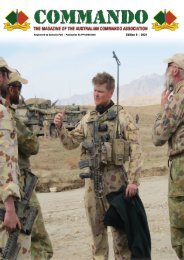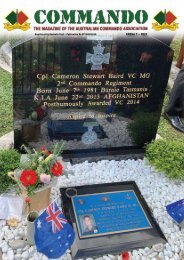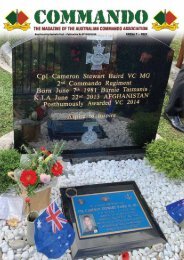OFFICIAL Commando News Magazine Edition 15 2023
The official magazine of the Australian Commandos Association
The official magazine of the Australian Commandos Association
You also want an ePaper? Increase the reach of your titles
YUMPU automatically turns print PDFs into web optimized ePapers that Google loves.
officers looking for recruits for a "special mission".<br />
Conditions of acceptance were at that time rather rigid<br />
in that one had to be a bushman, able to live off the<br />
land, be one hundred per cent fit and single.<br />
Captain Spencer Chapman and Captain Mike<br />
Calvert had escaped from France with the British<br />
expeditionary force at the Dunkirk evacuation and were<br />
selected to come to Australia and form commando<br />
units.<br />
Their names would be well known to most members<br />
of our Association especially the earlier units, and they<br />
both became famous soldiers in Malaya and Burma.<br />
This is not surprising as they were both highly<br />
trained very tough buddies, extremely fit and set<br />
standards of physical toughness few could follow after<br />
numerous notorious escapades during the war in South<br />
East Asia they both returned to England where they<br />
wrote the most fascinating books about their wartime<br />
experiences. Chapman wrote "The Jungle is Neutral"<br />
while Calvert wrote "Prisoners of Hope". Both very<br />
exciting stories and you should read them.<br />
Now back to my introduction to the Promontory.<br />
There were three of us as an advance party dumped in<br />
the scrub just this side of the Darby River Bridge, from<br />
memory it was my birthday — 5 th April 1941.<br />
There was Butch Horgan, Dennis Warner (later to<br />
become a well-known war correspondent) and myself.<br />
We were all from the 8 th Div. Cav. and felt rather<br />
neglected after the army truck had dumped our tent<br />
and rations in the small open space in the scrub then<br />
cleared out.<br />
I was down there recently, and it hasn't changed<br />
much in fifty years.<br />
At that time the Promontory was virtually<br />
uninhabited and in its natural state. It was a national<br />
park with a ranger at Darby River and two lighthouse<br />
keepers thirty kilometres further along a walking track.<br />
Our camp was started at Darby, which was some 65<br />
kms from the nearest town, Foster, by a very rough<br />
gravel road and thus we felt the isolation and<br />
depression that resulted.<br />
To make the situation a lot worse the season broke<br />
and the wild gales plus seven inches of rain that came<br />
in off the Southern Ocean contributed to our misery.<br />
Our tent blew to glory, our swags were saturated, and<br />
tucker mostly ruined so little wonder Butch and Dennis<br />
blew through.<br />
They got back to the unit at Balcombe, were<br />
received with open arms and sailed to the Middle East<br />
a couple of weeks later.<br />
I decided to "stick", and a few days later Chapman<br />
and Calvert arrived with a large contingent of the first<br />
company.<br />
At first it was a tent camp at the Darby River site, but<br />
building of a permanent camp there and at Tidal River<br />
together with a vehicle road to link them was going<br />
ahead apace.<br />
One thing I cannot forget was the daylight swim, we<br />
were all subjected to, either dive from the bridge into<br />
that black uninviting river or run the five hundred<br />
metres then into the raging Southern Ocean.<br />
Our English officers appeared to enjoy the<br />
experience although by this time it was into a very wet<br />
cold winter.<br />
What a great destroyer of sexual fantasies it was for<br />
those inclined that way.<br />
With ten hours of training each day we soon<br />
became very fit and some of our wilder exploits when<br />
we hit Fish Creek or Foster on the rare weekend breaks<br />
are definitely best forgotten.<br />
When the road to No. 1 camp on the hill this side of<br />
Tidal River was trafficable and the camp built, we<br />
moved in and advanced our training.<br />
One exercise I well remember was hiking with Ralph<br />
Kelly and ‘Screamer’ Heatherington to the lighthouse<br />
and then along the east coast to Sealers Cove and<br />
back to camp. This unchartered route climbing over<br />
miles of basalt rocks was a very hazardous experience<br />
and took us four days.<br />
Another exercise that comes to mind was the<br />
regular early morning run up to the Trig Point on Mount<br />
Oberon and back. I did this P.T. exercise many times<br />
with my good friend 'Wato' whom a lot of you will<br />
remember from No. 1 Company and later in New<br />
Guinea with, I think, No.5.<br />
We held the record for this climb for some months<br />
until the New Zealanders followed us into the camp.<br />
Our time was 1 hour 55 minutes up and back. I<br />
wouldn't like to do it now!!<br />
After several months of toughening up and training<br />
in the ways of commandos together with the<br />
cementing of our establishment as No. 1 Independent<br />
Company, we were alerted to the fact that we were not<br />
going to finish our training in Scotland as had been<br />
originally planned but in fact we were off to the Pacific<br />
Islands.<br />
Intelligence information indicated correctly that the<br />
Japs were coming into the war and our unit was to be<br />
directed there as an intelligence screen for the western<br />
Pacific islands.<br />
As history relates, the spread of our nine sections<br />
throughout many islands from Manus in the north to<br />
Vila (in the New Hebrides) in the south, sealed the<br />
doom of our company. Sections of 21 men had only a<br />
minimal effect on the monstrous enemy force that<br />
descended on the islands during the Coral Sea Battle.<br />
No. 1 Section was stationed at Tulagi in the Solomons<br />
at the time and after a few exciting days we were<br />
instructed to escape.<br />
Some of us were lucky and got out by island<br />
hopping in small boats, but not so fortunate were<br />
those further north in the vicinity of Rabaul where<br />
escape was extremely difficult.<br />
And so now having revived a few memories I will<br />
look forward to the reunion and 50th Anniversary at<br />
Tidal River in November this year, where I look forward<br />
to meeting some of one's greatest mates ever.<br />
oOo<br />
48 COMMANDO ~ The <strong>Magazine</strong> of the Australian <strong>Commando</strong> Association ~ <strong>Edition</strong> <strong>15</strong> I <strong>2023</strong>


